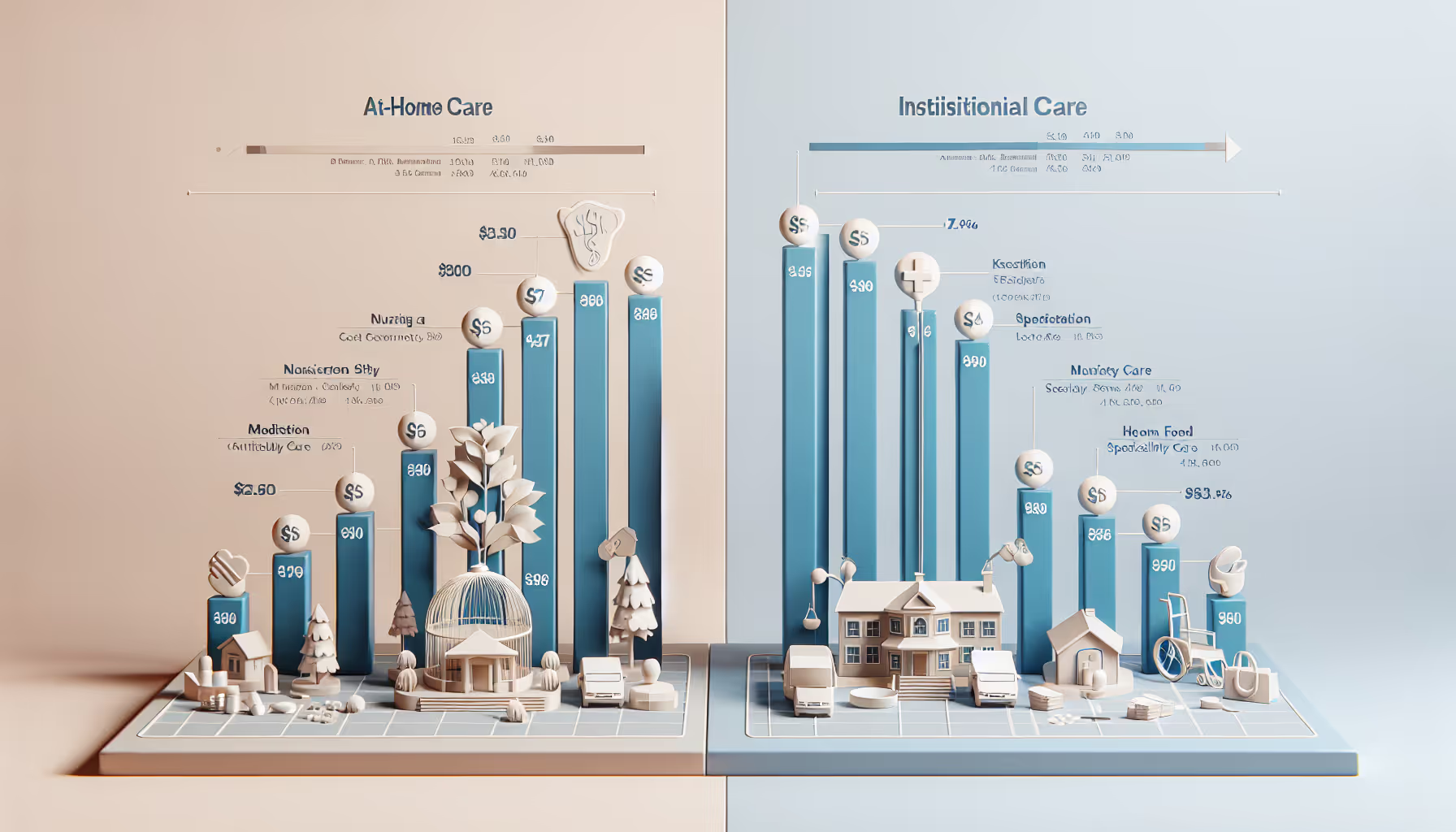Preferred Home Care Unveiled
Discover Preferred Home Care - providing exceptional care services with a skilled team, unmatched safety measures, and employment opportunities.

Home Care Services Overview

Introduction to Home Care
Home care refers to a range of services provided to individuals who require assistance or medical care but prefer to remain in the comfort and familiarity of their own homes. It encompasses a wide spectrum of care options, from basic assistance with daily activities to specialized medical attention, tailored to meet the unique needs of each individual, promoting independence, well-being, and quality of life.
The goal of home care is to provide personalized support that allows individuals to maintain their independence and remain in familiar surroundings. It offers a compassionate and holistic approach to care, focusing on the physical, emotional, and social well-being of the individual. Home care services can be customized to address various needs, including personal care, medication management, meal preparation, transportation, and companionship.
Benefits of Home Care
Home care services offer numerous benefits for individuals receiving care, contributing to their overall well-being and happiness. Some key advantages of home care services include:
- Specialized Assistance: Home care services provide specialized assistance tailored to the unique needs of each individual. Care plans are developed based on a comprehensive assessment to address specific requirements, ensuring personalized care that promotes independence and well-being.
- Promoting Independence: By receiving care in the familiar environment of their own home, individuals can maintain their independence and autonomy. Home care services focus on empowering individuals to continue engaging in activities they enjoy and promoting a sense of purpose.
- Maintaining Personal Hygiene and Dignity: Home care services encompass personal care assistance, ensuring individuals receive support with activities such as bathing, grooming, and dressing. This helps maintain personal hygiene and dignity, enhancing overall well-being.
- Respite Care for Family Caregivers: Home care services can also provide respite care to support family caregivers. Caregiving can be physically and emotionally demanding, and home care services offer relief and support to family members, allowing them to take breaks and attend to their own needs.
- Familiar Surroundings: Remaining in the comfort of their own home allows individuals to be surrounded by familiar belongings, memories, and loved ones. This familiarity can contribute to emotional well-being and a sense of security.
When deciding between home care and facility-based care, it's essential to consider the unique needs, preferences, and circumstances of the individual requiring care. Home care services offer distinct benefits that contribute to the overall well-being and happiness of individuals receiving care. By choosing home care, individuals can receive personalized support in the comfort of their own homes, fostering independence and enhancing their quality of life.
Preferred Homecare Services
When it comes to providing exceptional home care services, Preferred Homecare stands out by offering a range of specialized and comprehensive care options. Their commitment to quality care is exemplified through their skilled team members, emphasis on safety, and employment opportunities.
Skilled Team Members
Preferred Homecare takes pride in their team of skilled professionals who are dedicated to delivering top-notch care to individuals in need. Their team consists of qualified caregivers, including registered nurses, home health aides, physical therapists, occupational therapists, speech therapists, and medical social workers. These professionals possess the necessary expertise and experience to provide personalized care tailored to meet the specific requirements of each client.
Emphasis on Safety
Safety is a paramount concern for Preferred Homecare. They prioritize creating a safe environment for clients, ensuring their well-being and peace of mind. By implementing rigorous safety protocols, training their staff on proper procedures, and conducting regular assessments, Preferred Homecare maintains a high standard of safety in their home care services. This emphasis on safety extends to all aspects of care, including medication management, infection control, fall prevention, and emergency preparedness.
Employment Opportunities
Preferred Homecare recognizes the importance of attracting and retaining skilled caregivers. As such, they provide employment opportunities for individuals interested in pursuing a career in the field of home care services. By offering competitive compensation, ongoing training, and a supportive work environment, Preferred Homecare attracts compassionate and dedicated professionals who are committed to making a positive impact in the lives of their clients.
Preferred Homecare's commitment to providing skilled team members, prioritizing safety, and offering employment opportunities sets them apart as a trusted provider of home care services. Their focus on excellence ensures that individuals receiving care from Preferred Homecare receive the best care possible in the comfort and familiarity of their own homes.
Pricing Strategies in Home Care
When it comes to pricing home care services, providers employ various strategies to determine the cost of their services. Each pricing strategy has its own advantages and considerations. Here are five common pricing strategies found in the home care industry:
Cost-Plus Pricing
Cost-plus pricing involves calculating the cost of providing home care services and adding a mark-up to ensure profitability. This strategy takes into account all the direct and indirect costs associated with delivering high-quality care to clients. The mark-up added helps cover overhead expenses and contributes to the provider's profit margin.
Competitive Pricing
Competitive pricing is a strategy where home care providers set their prices based on what their competitors charge. By aligning their prices with the market average, providers aim to remain competitive and attract clients. This strategy requires careful monitoring of the pricing strategies of other home care providers in the area.
Price Skimming
Price skimming is a strategy where home care providers initially set a higher price for their services and then gradually lower it over time. This approach is often used for introducing new and innovative services in the market. By setting a higher price initially, providers can capture the early adopters and recoup their investment. As time goes on, the price is lowered to attract a wider customer base.
Penetration Pricing
Penetration pricing involves setting a lower price for home care services to quickly gain market share and build a large customer base [3]. This strategy is often used by new providers entering the market or by existing providers aiming to expand their reach. By offering competitive pricing, providers can attract clients who are price-sensitive and may be willing to switch from their current provider.
Value-Based Pricing
Value-based pricing is a strategy where the price of home care services is based on the perceived value by the customer. Providers consider factors such as the quality of care, personalized attention, and additional services offered. By focusing on the value they provide, providers can justify higher prices and attract clients who prioritize quality and individualized care.
It's important to note that pricing in the home care industry can vary based on factors such as location, level of care required, and additional services provided. Home care providers often offer personalized pricing plans tailored to the unique needs of each client. By understanding the different pricing strategies available, individuals seeking home care services can make informed decisions based on their budget, preferences, and desired level of care.
Home Care vs. Home Health Care
When it comes to providing care for individuals who require assistance or medical attention, there are two primary options to consider: home care and home health care. While these terms are often used interchangeably, it is important to understand the differences between the two and the factors that influence the choice between them.
Understanding the Differences
Home health care, as defined by the National Center for Biotechnology Information (NCBI) Bookshelf, refers to a system of care provided by skilled practitioners, such as nurses, therapists, and medical social workers, to patients in their homes under the direction of a physician. This type of care focuses on providing medical services, including nursing care, therapy, and social services, to help individuals improve function, promote well-being, and avoid hospitalization or admission to long-term care institutions.
On the other hand, home care, according to Ohana Care, encompasses a broader range of services provided to individuals who require assistance or medical care but prefer to remain in the comfort of their own homes. Home care is tailored to meet the unique needs of each individual, promoting independence, well-being, and quality of life. It may include basic assistance with daily activities, companionship, personal care, medication management, and specialized medical attention, depending on the individual's requirements.
One key distinction between home care and home health care is the level of medical expertise provided. Home health care focuses on delivering skilled medical services under the supervision of a physician, whereas home care caters to a wider range of individual needs, including non-medical assistance and support.
Factors Influencing Choice
When deciding between home care and home health care, several factors come into play. These factors may include the individual's medical condition, level of assistance needed, personal preferences, and financial considerations.
For individuals with complex medical needs, such as those requiring specialized nursing care or therapy, home health care may be the preferred option. The skilled professionals in home health care can provide the necessary medical treatments, monitor health conditions, and ensure adherence to prescribed therapies.
On the other hand, individuals who require assistance with activities of daily living, companionship, or non-medical support may find home care to be a better fit. Home care services focus on promoting independence and maintaining a comfortable living environment while providing personalized care tailored to the individual's preferences and unique circumstances.
Financial considerations also play a significant role in the decision-making process. Home care services can vary in cost depending on the level of care required and the duration of services. Home health care services, on the other hand, may be covered by insurance, such as Medicare, if deemed medically necessary by a physician and provided on an intermittent and noncontinuous basis [4].
Ultimately, the choice between home care and home health care should be based on the individual's specific needs, preferences, and circumstances. It's important to assess the level of medical attention required and consider the benefits and limitations of each option. Consulting with healthcare professionals and discussing available care options with loved ones can help make an informed decision that ensures the best possible care for the individual in need.
Financial Aspects of Home Care
When considering home care services for your loved ones, understanding the financial aspects is crucial for making informed decisions. The costs associated with home care can vary depending on the type and extent of care required. Let's explore some key financial considerations, including cost considerations, insurance coverage, and government assistance.
Cost Considerations
The cost of home care services can depend on several factors, including the level of care needed and the geographical location. According to Ohana Care, national median cost of home care in 2023 is $30 per hour. However, it's important to note that costs may vary based on state wage laws, agency requirements, and the specific services provided.
It's recommended to research local home care providers to get a more accurate understanding of the cost range in your area. Discussing your specific needs with potential providers can help you obtain detailed cost estimates and information about any additional fees that may apply.
Insurance Coverage
Insurance coverage is an important factor to consider when planning for home care services. Most private health insurance plans do not typically cover the full cost of home care but may offer some coverage for certain services. It's essential to review the terms and conditions of your insurance policy to understand the extent of coverage available.
Medicare and Medicaid, two government-funded healthcare programs in the United States, may provide coverage for home care services under certain circumstances. Eligibility criteria must be met, and the services must be deemed medically necessary. Consulting with an insurance specialist or reaching out to the respective programs can help you determine if you qualify for coverage.
Additionally, long-term care insurance is an option to consider, as it may provide coverage for home care services. Long-term care insurance policies vary in terms of coverage limits, waiting periods, and eligibility requirements. Reviewing the specifics of your policy or exploring long-term care insurance options can provide insights into potential coverage for home care services.
Government Assistance
Government assistance programs can provide financial support for individuals in need of home care services. Some programs aim to assist low-income individuals and families with the costs associated with home care. Medicaid, for example, may offer coverage for home care services for eligible individuals.
It's advisable to research local government assistance programs to determine if you or your loved ones qualify for financial support. Government websites, social service organizations, or healthcare professionals can provide guidance on available programs and the application process.
By considering the financial aspects of home care services, including cost considerations, insurance coverage, and government assistance, you can make well-informed decisions regarding the care of your loved ones. Exploring different payment options, understanding insurance policies, and seeking available financial resources can help ease the financial burden associated with home care services.
Standout Attributes of Home Care Providers
When choosing a home care provider for your loved ones, it's important to consider the standout attributes that set certain providers apart from the rest. These attributes can make a significant difference in the quality of care and overall experience. Let's explore three key standout attributes of home care providers: customer service excellence, qualified caregivers, and awards and recognition.
Customer Service Excellence
Exceptional customer service is crucial for a home care provider to differentiate themselves from their competitors. It involves going above and beyond to address individual client needs and resolve any issues effectively. Providers that prioritize customer service strive to create a positive and supportive environment for both clients and their families. They actively listen to client feedback and take steps to continuously improve their services.
To ensure excellent customer service, home care providers may utilize various channels for client feedback, such as telephone interviews or online surveys. According to the 2016 Home Care Benchmarking Study, 36.8% of seniors preferred telephone interviews for providing feedback on client satisfaction, while only 3.7% opted for online surveys. This preference highlights the importance of personalized interactions and the opportunity for clients to express their concerns directly.
Qualified Caregivers
The quality of caregivers is a key factor that sets home care providers apart. Hiring qualified and reliable caregivers is essential, as they are the face of the company and have a significant impact on customer satisfaction. Providers that prioritize the recruitment and training of caregivers ensure that their team members possess the necessary skills, experience, and compassion to provide the best possible care.
By investing in the ongoing professional development of their caregivers, home care providers can ensure that their team stays updated with the latest best practices and caregiving techniques. This commitment to continuous improvement helps to enhance the overall quality of care and build trust with clients and their families.
Awards and Recognition
Highlighting awards and recognition can significantly set a home care provider apart from competitors. Awards, such as a Best of Home Care award, demonstrate a commitment to excellence and professionalism. They serve as a testament to the provider's dedication to delivering high-quality care and exceptional service. When considering home care options, it's worthwhile to explore providers that have received industry recognition for their outstanding performance.
By showcasing awards and accolades, home care providers demonstrate their commitment to meeting and exceeding industry standards. These recognitions can instill confidence in clients and their families, providing reassurance that their loved ones will receive the best possible care.
The standout attributes of customer service excellence, qualified caregivers, and awards and recognition are essential considerations when selecting a home care provider. By prioritizing these attributes, providers can deliver exceptional care and create a positive and supportive environment for their clients and their families.
References
- https://ohanacare.ca/blog/ultimate-home-care-services-guide/
- https://www.preferredhomecare.com/why-preferred-homecare
- https://www.bdc.ca/en/articles-tools/marketing-sales-export/marketing/pricing-5-common-strategies
- https://www.ncbi.nlm.nih.gov/books/NBK2631/
- https://www.homecarepulse.com/articles/5-things-that-set-a-provider-apart-from-the-rest-2/


.avif)






.avif)
.avif)
.avif)
.avif)





















































.avif)

































